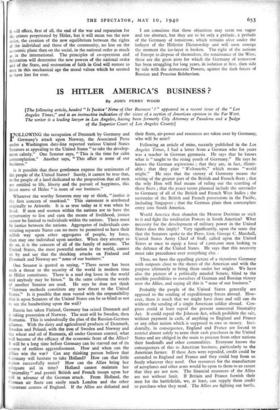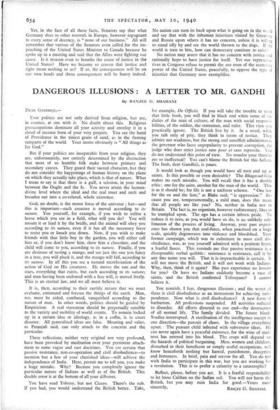IS HITLER AMERICA'S BUSINESS?
By JOHN PERRY WOOD [The following article, headed "Is lustice 'None of Our Business ' ?" appeared in a recent issue of the "Los Angeles Times," and is an instructive indication of the views of a section of American opinion in the Far West. The writer is a leading lawyer in Los Angeles, having been formerly City Attorney at Pasadena and a Iudge of the Superior Court of Los Angeles County] FOLLOWING the occupation of Denmark by Germany and Germany's attack upon Norway, the Associated Press under a Washington date-line reported various United States Senators as appealing to the United States "to take the develop- ment calmly." One Senator says, "This is the time for calm contemplation." Another says, "This affair is none of our business."
Is it possible that these gentlemen express the sentiments of the people of the United States? Surely, it cannot be true that, to the people of a land dedicated to the proposition that all men are entitled to life, liberty and the pursuit of happiness, this latest move of Hitler "is none of our business."
Whatever the worthy Senators may say or think, "justice is th2 first concern of mankind." This statement is attributed originally to Aristotle. It is as true today as it was when he lived. If men and women within the nations are to have the opportunity to live and earn the means of livelihood, justice cannot be limited to individuals within the nations. There must be justice between the nations. Aggregates of individuals con- stituting separate States can no more be permitted to have their selfish way upon other aggregates of people, by force, thin may one individual upon another. When they attempt to do so, it is the concern of all of the family of nations. The United States, the most powerful nation in the world, cannot sit by and say that the shocking attacks on Finland and Denmark and Norway are "none of our business."
One Senator is quoted as saying, "There never has been such a threat to the security of the world in modern time as Hitler constitutes. There is a mad dog loose in the world and anybody may be bitten." In the same column the words of another Senator are used. He says he does not think "German methods constitute any new threat to the United States." Is it possible that men vested with the responsibility that is upon Senators of the United States can be so blind as not to see the handwriting upon the wall?
Russia has taken Finland, Germany has seized Denmark and is taking possession of Norway. The next will be Sweden, then Rumania. This is undoubtedly the plan of the Russian-German alliance. With the dairy and agricultural products of Denmark, Sweden and Poland, with the iron of Sweden and Norway and the wheat and oil of Rumania, all under German control, what will become of the efficacy of the economic front of the Allies? It will be a long time before Germany can be starved out of its course of ruthless aggrandisement. How and when can the Allies win the war? Can any thinking person believe that Germany will hesitate to take Holland? How can that little anion successfully resist? How can the Allies bring her adequate aid in time? Holland cannot maintain her " neutrality " and permit British and French troops upon her soil in advance of the German attack. From Holland, the German air fleets can easily reach London and the other —noortant centres of England. If the Allies are defeated and their fleets, air-power and resources are taken over by Germany, who will be next?
Following an article of mine, recently published in the Los Angeles Times, I had a letter from a German who for years was a teacher in German gymnasia. He says that he knows what is "taught to the rising youth of Germany." He says he knows the German aspirations ; that they are, in fact, illimit- able ; that they plan " Weltmacht," which means "world might." He says that the victory of Germany means the seizing of the greater part of the British and French fleets ; that the wily Hun will find means of ruling out the scuttling of these fleets ; that the peace terms planned include the surrender to Germany of all of the British and French West Indies ; the surrender of the British and French possessions in the Pacific, including Singapore ; that the German plans then contemplate entry into South America.
Would America then abandon the Monroe Doctrine or stick to it and fight the totalitarian Powers in South America? What necessity for the development of military power in the United States does this imply? Very significantly, upon the same day that the Senators spoke to the Press, Gen. George C. Marshall, United States Army Chief of Staff, called upon the United States at once to equip a force of t,000,000 men looking to the defence of the United States. He says that this necessity must take precedence over everything else.
Thus, we have the appalling picture of a victorious Germany with outposts close to the shores of the Americas and with the purpose ultimately to bring them under her might. We have also the picture of a politically minded Senate, blind to the terrible possibilities to ourselves of German and Russian victory over the Allies, and saying all this is "none of our business."
Probably the people of the United States generally are opposed to the sending of expeditionary forces abroad. How- ever, there is much that we might have done and still can do without the sending of a single American soldier abroad. Con- gress could at least repeal the present unneutral Neutrality Act. It could repeal the Johnson Act, which prohibits the sale, without payment in cash, of anything to England and France or any other nation which is supposed to owe us money. Inci- dentally, in consequence, England and France are forced to restrict almost solely to arms their cash purchases in the United States and are obliged in the main to procure from other nations their foodstuffs and other commodities. Everyone knows the consequences of this to American business, particularly to the American farmer. If these Acts were repealed, credit could be extended to England and France and they could buy from us freely whatever they need. Our resources for the manufacture of aeroplanes and other arms would be open to them to an extent that they are not now. The financial resources of the Allies are not without limit. If Britain and France furnish their men for the battlefields, we, at least, can supply them credit to purchase what they need. The Allies are fighting our battle. Yet, in the face of all these facts, Senators say that what Germany does to other neutrals in Europe, however repugnant to every sense of decency, is "none of our business." All will remember that various of the Senators even called for the im- peaching of the United States Minister to Canada because he spoke up in a meeting and said that the Allies were fighting our cause. Is it treason even to breathe the cause of justice in the United States? Have we become so craven that justice and right mean nothing to us? If so, the consequences will be on our own heads and those consequences will be heavy indeed. No nation can turn its back upon what is going on in the weld and say that with the inhuman injustices visited by Germ,:nv and Russia upon others it has no concern, unless it is Willing to stand idly by and see the world thrown to the dogs. If the world is torn to bits, how can democracy continue to exist?
No nation may assert that it has no concern with justice :-.nd rationally hope to have justice for itself. Yet our representa- tives in Congress refuse to permit the use even of the economic power of the United States, peacefully, to oppose the type of injustice that Germany now exemplifies.































 Previous page
Previous page